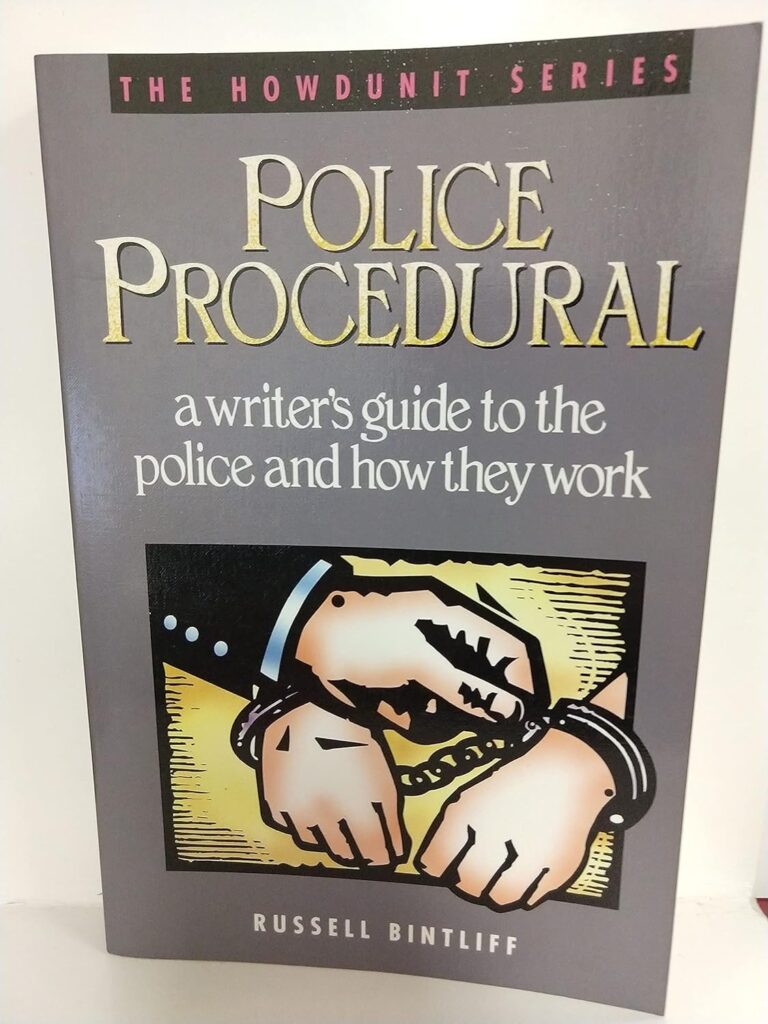
Qualified Ignorance
By Ray Tabler
I don’t know everything. A condition I share with most of humanity. Some people do know it all. And they’ll make sure you’re aware of that. But, not me. Which is a problem for a writer. Because often writing involves telling stories about situations and people you don’t really know much about. There are two choices. Fake it. Just start typing, and hope the reader is at least as ignorant as you. Or, spend some time before hand, researching to chip away at your ignorance. Police procedure is a case in point. Fortunately, there’s plenty of material available on this subject.
While browsing the bargain table at a used book store, I found the book pictured above, Police Procedural-A Writer’s Guide to the Police and How They Work, for $1.50. A steal! I’m not planning on writing a crime novel. But it looks like a good reference work to have on the shelf. It’s possible I’ve subconsciously avoided writing science fiction stories involving crime, because I don’t feel comfortable with my unfamiliarity in the area. The book is a bit dated, 1993. Police work must’ve changed somewhat in the past thirty years. Cyber-crime is a category not mentioned. But the overwhelming majority of the information is likely still valid. If I were to write a science fiction story involving the police, I, no doubt, would have to “futurize” many aspects anyway.
For me, the real value of this work lay in the treasure trove of details glossed over in TV shows like Dragnet, The Mod Squad, or Barney Miller. Such entertainment tosses around terms like Robbery/Homicide Division, Booking, and Traffic Control without explaining them. That’s because they’re not in the business of educating the viewer in the nitty gritty of keeping the peace. Whatever doesn’t keep you watching through the commercial break is excess baggage. The same is true, to some degree, for the story you’re writing, but having a firm grasp of valid details helps the writer to tell a better story.
Among other topics listed are nominal organizational structures for police departments, how different types of officers spend their days, and how they’ll interact with the courts. A surprisingly interesting aspect was a diagram of an average police station layout. Along with the expected evidence locker and holding cells, is a “report-writing” room. The revelation that there’s an entire room in a police station set aside for filling out paper work sheds light on real-world priorities. When you come right down to it, police officers must spend a large, and probably annoying, percentage of their time filling out forms. Beyond the likely frustration officers feel, the report-writing room also offers opportunities for the author.
A rookie could ask for help in writing up a report, revealing backstory in a way that sets up an acceptable info-dump. People could argue over whether you can eat in the room or not. (Because you know that’s just the type of quarrel which would erupt.) A simmering dispute over some trivial internal matter like smelly food in the report-writing room lays the ground work for escalating conflict between characters. Another character reveals his personality by how he reacts to fellow officers bickering over the eating question while he’s trying to finish his report. The more specifics you know about a profession, the better you are able to subtly draw the reader into the story. The richer the details the more effective the illusion of reality surrounding the characters.
Is this particular book the ultimate reference about police procedure? I have no idea. Maybe. Are there other books on the subject? Certainly. I encourage you to look into it. Will this book teach me everything about what police do? Of course not. Only working as a police officer or in an adjacent role will come close to accomplishing that. An actual police officer will shake his head over my best efforts. The most I can hope for is to shroud my ignorance well enough to satisfy the casual reader.
This volume looks like it meets my needs, at the moment. It also possessed the unparalleled advantage of being right in front of me for only $1.50. There is apparently an entire line of writer’s guides from the same publisher, the “Howdunit Series.” Other areas include forensics, effects of poisons, and investigative techniques. If you can find them on the bargain table or in the library, it ought to at least make your browsing history less suspicious.
END.
Shameless Self-Promotion Section:
Check out my novels at Histria Books https://histriabooks.com/product-tag/ray-tabler/
- The Diesel-Powered Starship (due for release in September 2025) https://histriabooks.com/product/the-diesel-powered-starship/
- A Grand Imperial War (Book 1 of the Grand Imperial series) https://histriabooks.com/product/a-grand-imperial-war-grand-imperial-series-book-1/
- A Grand Imperial Heir (Sequel to A Grand Imperial War) https://histriabooks.com/product/a-grand-imperial-heir-grand-imperial-series-book-2/
- Fool’s Paradise https://histriabooks.com/product/fools-paradise/
